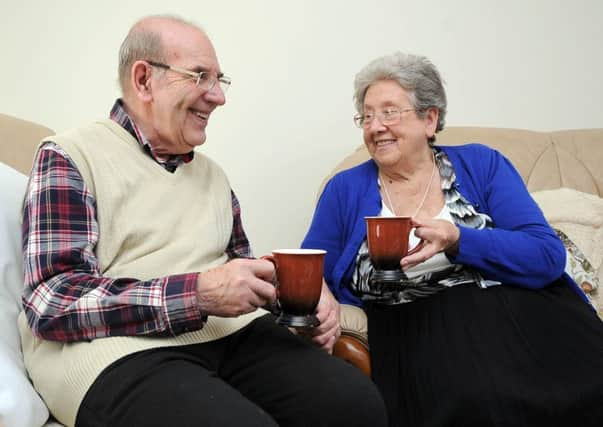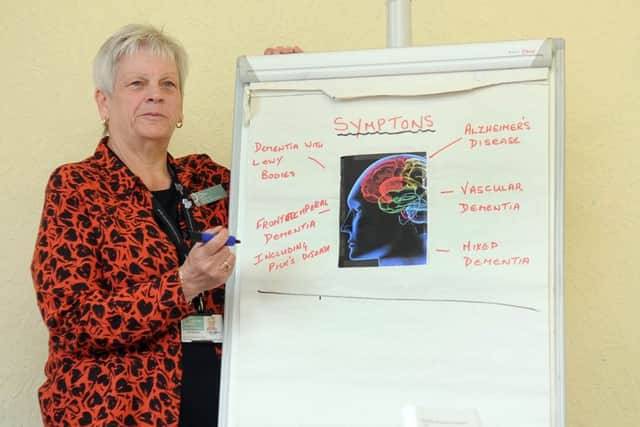Helping those living with dementia


PLACED on a wall in a quiet corner of the Stirling Day Centre in Doncaster is a painting of a tree, covered in dozens of heart-shaped tags, each bearing the name of a much loved husband, wife, father or mother.
Each received support in some form from the Centre, home to the Royal Voluntary Service’s Dementia Support Service in the town.
Advertisement
Hide AdAdvertisement
Hide Ad“We have a lady in her 90s, and she’ll come up to board, kiss her finger, and place it on her husband’s heart. For that second she remembers that he’s gone,” Jan Burrows, dementia support manager, tells me. “But then she’ll walk down the corridor and will go back to talking about how she needs to get home because her husband will be cooking the tea and the kids are due back from school. She slips back again.”


In Doncaster, it is estimated that there are 4,000 people living with dementia. In the UK as a whole, there are around 850,000, with that figure set to rise to over 1 million by 2025.
For them, the world can be a confusing, lonely but often delightful place, and the Dementia Support Service is just one of a number of charity services and initiatives across Yorkshire offering relief, help and practical support.
This year, the Dementia Support Service hopes to help at least 120 people with its Good Neighbours Service, which offers people with the condition and their families help to remain living at home, be it helping with shopping or tasks around the house or simply offering company so carers can get a break.
Advertisement
Hide AdAdvertisement
Hide AdIt is able to help more people than ever this year after it was awarded £30,000 by Players of the People’s Postcode Lottery, but it is desperately reliant on volunteers.


Good Neighbours is just one part of the service offered by Jan and her volunteers. When I arrived at the Day Centre on a weekday morning, the staff were busy preparing for the arrival of buses from across the district, which drop off around 45 people every day.
The Day Centre provides a safe space where people can take part in activities like indoor bowls, woodwork games and crafts, but also see a hairdresser and have support to have a bath.
“No day is ever the same - or can really be planned, as it all depends on how people are,” Jan said.
Advertisement
Hide AdAdvertisement
Hide AdShe shows me the lounge, a comfortable, smaller room where those who need more intensive support can watch a film, play a game, or take part in reminiscence activities, all in a safe, controlled environment, and the garden, where people with dementia are encourage to go outside.
But today we’re not here to tend to the vegetables or even take part in a Wii tournament that could get underway later. Today, two new volunteers will take part in their induction dementia awareness training, part of six weeks of learning and support before they will go out and visit people as part of the Good Neighbours scheme.
John Tuffour, who hopes to build up experience before applying for a nursing course, and Victoria Coffie-Shand, whose aunt has dementia, are joined by existing day centre volunteer John Millington to learn the basics of what dementia is and how invaluable giving up their time, even for just a couple of hours a week.
Jan tells us: “When I first go to see an adult with dementia, I see a person not a label. It’s my job to find that person, whether they are in their 90s and are speaking about their parents as if they are still here, or have been retired for years but talking about their job down the pit. If you imagine a bookcase toppling over, the books from the top shelves fall first. That is dementia - you have to find out how many books have fallen to find them. The world can be incredibly frightening.”
Advertisement
Hide AdAdvertisement
Hide AdAfter the induction, I join Jan on a visit Colin and Barbara Watts in nearby Rossington. The couple have been married for 61 years after meeting at their local methodist church in Mansfield when Barbara was 18 and Colin 19, shortly before he joined the RAF. Following his service, a career with the coal board beckoned, and the couple moved to Doncaster.
In 2013, life changed. Colin, now 84, began having trouble remembering things and was eventually diagnosed with early onset dementia, along with Parkinson’s Disease. They are new to the Dementia Support Service, after being referred by the Memory Clinic.
Barbara, 83, said: “It’s made life harder. The days are long, and with me being disabled too, I struggle sometimes. It’s very nice to know someone is there, it stops you feeling that you’re on your own.”
Jan would love to reach even more of the people like Colin and Barbara who are living with dementia, but to do that, she needs more volunteers.
Advertisement
Hide AdAdvertisement
Hide AdShe said: “In those two hours, a carer might have to pop to the shop or hospital. It can be a lifeline. For the person with dementia, they feel valued and respected as an individual, they are treated like a human being.
“In the last two month eight of the volunteers have got jobs, which is great, but it has left us without and the need is growing. At the moment I have 15 volunteers but would like to have 50 by the end of the year.”
It can also change the direction your life is heading, as Heather Lysiak, 20, of York, knows first hand.
Her grandmother Grace Butcher was diagnosed with vascular dementia when she was 11. When she started York University she became involved in Minds in Motion, a community group founded by students. She began volunteering at a dementia cafe held each month at St Aelred’s Community Centre at Tang Hall, the Harmony Cafe. This led to her becoming a dementia champion for The Alzheimer’s Society, and she now delivers Dementia Friends training as well as running the Cafe every third Saturday of the month.
Advertisement
Hide AdAdvertisement
Hide AdHeather said: “My grandmother made such a massive impact on my life. She was a nurse, a foster carer, and an incredible person. It really affected me as a teenager seeing her go through what she did. I wanted to learn about why it happened and help.”
Over the last two to three years, Harmony Cafe has grown from having around 30 people visit each month to regularly having 90 users.
“We provide a safe, welcoming and friendly place where everybody understands that some people may have limitations. Everybody is there to relax and socialise without fear of forgetting someone’s name or embarrassing themselves.”
For Heather, who has just finished a degree in English and philosophy, volunteering has changed her life. She now hopes to set up her own charity to help families affected by dementia.
Advertisement
Hide AdAdvertisement
Hide Ad“When I went to the Harmony Cafe for the first time, I was completely overwhelmed, I ad to leave and have a little cry it was so beautiful. I just wished my grandmother had had something like this.”
For more information about volunteering in Doncaster, contact Jan Burrows on 07714 898565. For the Harmony Cafe, email Heather Lysiak on [email protected]
A million friends and counting
Over a million people have signed up to become a Dementia Friend, an initiative set up by The Alzheimer’s Society to change perceptions of those living with dementia.
It’s easy to do. Just on to www.dementiafriends.org.uk and watch a short video, and you’ll be sent a pack explaining more. In the video, Gina, a 61-year-old former nurse who has Alzheimer’s disease, explains that dementia isn’t just a part of ageing.
Advertisement
Hide AdAdvertisement
Hide AdThe Alzheimer’s Society research shows that almost two thirds of people with dementia experience loneliness and almost half say they’ve lost friends after diagnosis.
Dementia Friends aims to tackle the stigma and lack of understanding that sees many people with the condition face social exclusion.